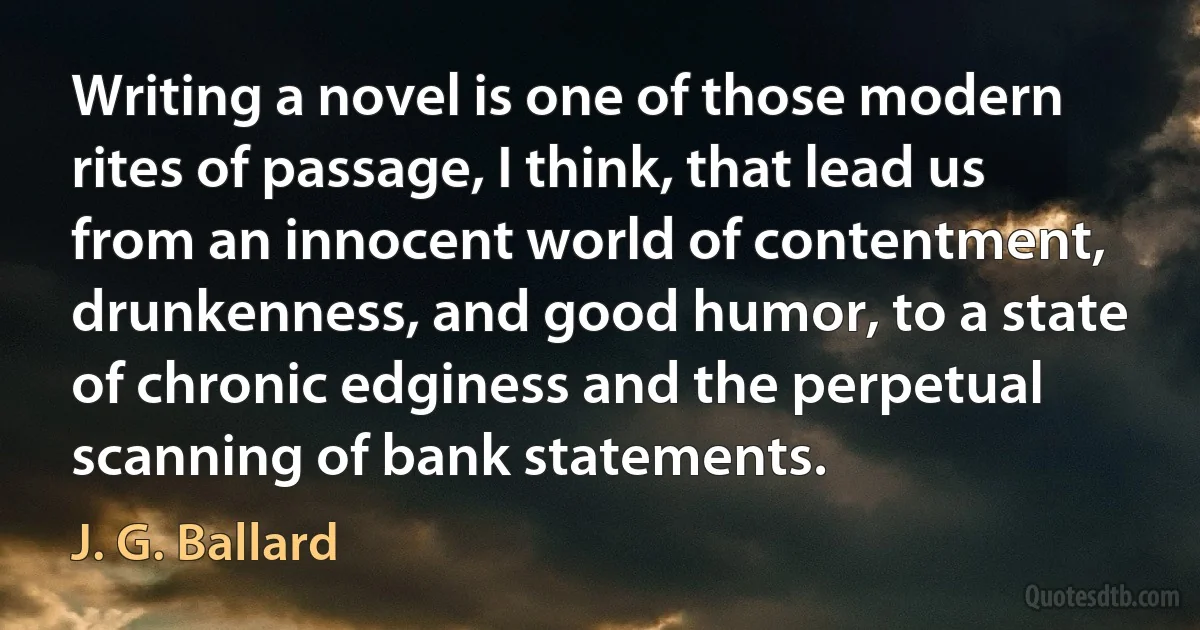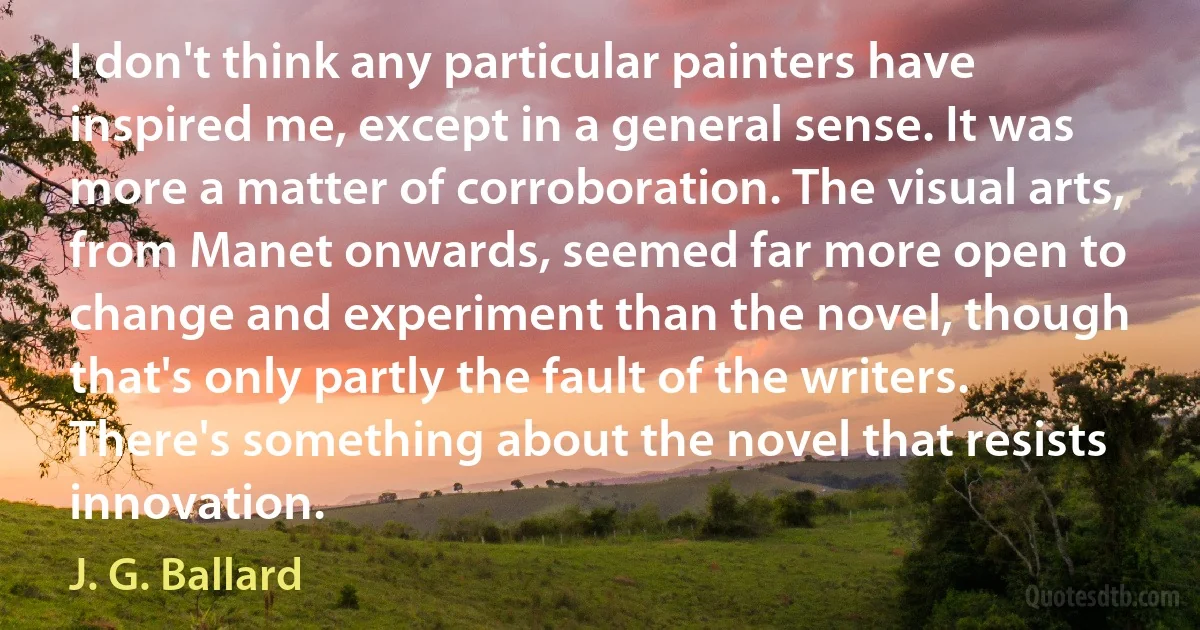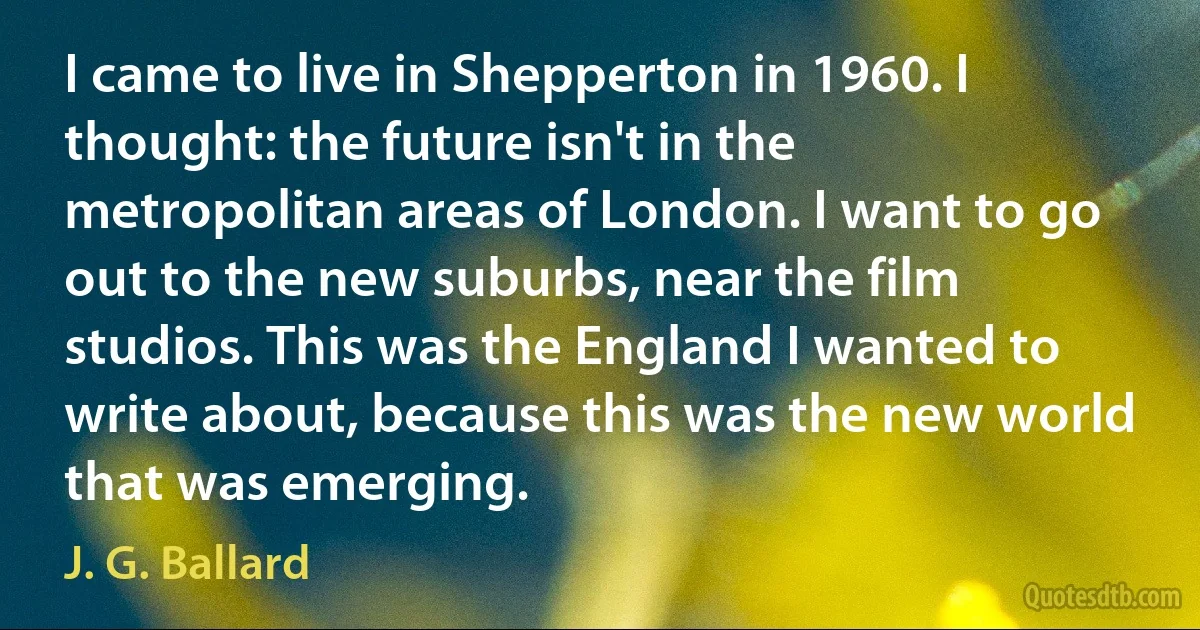J. G. Ballard quotes - page 5
Even one's own home is a kind of anthology of advertisers, manufacturers, motifs and presentation techniques. There's nothing 'natural' about one's home these days. The furnishings, the fabrics, the furniture, the appliances, the TV, and all the electronic equipment - we're living inside commercials.

J. G. Ballard
I suspect that many of the great cultural shifts that prepare the way for political change are largely aesthetic. A Buick radiator grille is as much a political statement as a Rolls Royce radiator grille, one enshrining a machine aesthetic driven by a populist optimism, the other enshrining a hierarchical and exclusive social order.

J. G. Ballard
I define Inner Space as an imaginary realm in which on the one hand the outer world of reality, and on the other the inner world of the mind meet and merge. Now, in the landscapes of the surrealist painters, for example, one sees the regions of Inner Space; and increasingly I believe that we will encounter in film and literature scenes which are neither solely realistic nor fantastic. In a sense, it will be a movement in the interzone between both spheres.

J. G. Ballard
For the sake of my children and grandchildren, I hope that the human talent for self-destruction can be successfully controlled, or at least channelled into productive forms, but I doubt it. I think we are moving into extremely volatile and dangerous times, as modern electronic technologies give mankind almost unlimited powers to play with its own psychopathology as a game.

J. G. Ballard
All over the world major museums have bowed to the influence of Disney and become theme parks in their own right. The past, whether Renaissance Italy or Ancient Egypt, is re-assimilated and homogenized into its most digestible form. Desperate for the new, but disappointed with anything but the familiar, we recolonize past and future. The same trend can be seen in personal relationships, in the way people are expected to package themselves, their emotions and sexuality, in attractive and instantly appealing forms.

J. G. Ballard
A hundred years ago one has the impression that people had made a clear distinction between the outer world of work and of agriculture, commerce and social relationships - which was real - and the inner world of their own minds, day-dreams and hopes. Fiction on the one hand; reality on the other. This reality which surrounded individuals, the writer's role of inventing a fiction that encapsulated various experiences going on in the real world and dramatising them in fictional form, worked. Now the whole situation has been reversed. The exterior landscapes of the seventies are almost entirely fictional ones created by advertising, mass merchandising... politics conducted as advertising. It is very difficult for the writer.
Given that external reality is a fiction, the writer's role is almost superfluous. He does not need to invent the fiction because it is already there.

J. G. Ballard
Twenty years ago no one could have imagined the effects the Internet would have: entire relationships flourish, friendships prosper...there's a vast new intimacy and accidental poetry, not to mention the weirdest porn. The entire human experience seems to unveil itself like the surface of a new planet.

J. G. Ballard
It's a mistake to imagine now we're all moving towards a state of happy primitivism. The model here seems to be less the noble savage than our un-innocent post-Freudian selves, outraged by all that over-indulgent toilet-training, dedicated breast-feeding and parental affection – obviously a more dangerous mix than anything our Victorian forebears had to cope with. Our neighbours had happy childhoods to a man and still feel angry. Perhaps they resent never having had a chance to become perverse.

J. G. Ballard



